初中英语教案反义疑问句的用法归纳表格.doc
初中英语反义疑问句用法归纳.docx

反义疑问句一、反意疑问句要点简述反意疑句又叫附加疑句,是在述句后,述句所叙述的事提出的疑。
其基本构有两种:一是“肯定述句+略否定句”;二是“否定述句+略肯定句”。
反意疑句后一部分的主与前一部分的主要保持人称、助及等方面的一致,即“三同一反”的原。
种疑句的回答要根据事,肯定的用“Yes,⋯”。
否定的用“No, ⋯”。
如:It looks like rain, doesn’ t itHe doesn ’ t need to work so late, does he二、学习反意疑问句,特别要注意的问题1)述部分的主是this, that,疑部分的主多用it;述部分的主是these, those,疑部分的主多用they如: This is a dictionary, isn’ t itThose are shelves, aren 2)述句如果是there be’ t they构,疑句部分仍用there。
如: There once was a man named Saint Nicholas, wasn’ t there3)在英口中,“I am + 表构”,后面的反意疑句多用aren ’ t I来体。
如: I am very interested in learning English, aren’ t I4)述句的主是不定式,的-ing形式或从句,疑部分的主多用it来体。
如: Taking care of our environment is very important, isn’ t itWhat he said is right, isn’ t it5)述句中含有not, no, hardly, neither, never, few, little, too⋯to等否定或具有否定意的,疑部分常用肯定形式。
如: Few people knew the news, did theyTom has never been to England , has he但述句中如果有否定意的前和后的,整个句子仍肯定句,反意疑部分多用否定形式。
反义疑问句 初中英语 语法
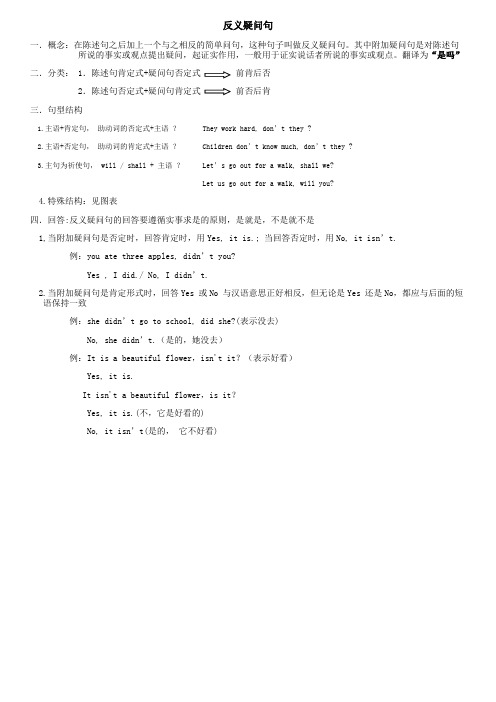
反义疑问句一.概念:在陈述句之后加上一个与之相反的简单问句,这种句子叫做反义疑问句。
其中附加疑问句是对陈述句所说的事实或观点提出疑问,起证实作用,一般用于证实说话者所说的事实或观点。
翻译为“是吗”二.分类: 1.陈述句肯定式+疑问句否定式前肯后否2.陈述句否定式+疑问句肯定式前否后肯三.句型结构1.主语+肯定句,助动词的否定式+主语?They work hard, don’t they ?2.主语+否定句,助动词的肯定式+主语? Children don’t know much, don’t they ?3.主句为祈使句, will / shall + 主语? Let’s go out for a walk, shall we?Let us go out for a walk, will you?4.特殊结构:见图表四.回答:反义疑问句的回答要遵循实事求是的原则,是就是,不是就不是1,当附加疑问句是否定时,回答肯定时,用Yes, it is.; 当回答否定时,用No, it isn’t.例:you ate three apples, didn’t you?Yes , I did./ No, I didn’t.2.当附加疑问句是肯定形式时,回答Yes 或No 与汉语意思正好相反,但无论是Yes 还是No,都应与后面的短语保持一致例:she didn’t go to school, did she?(表示没去)No, she didn’t.(是的,她没去)例:It is a beautiful flower,isn't it?(表示好看)Yes, it is.It isn't a beautiful flower,is it?Yes, it is.(不,它是好看的)No, it isn’t(是的,它不好看)。
(完整版)反意疑问句的用法归纳
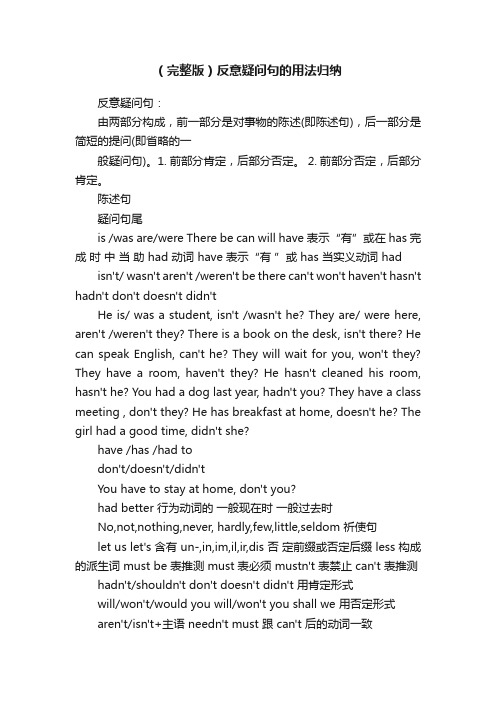
(完整版)反意疑问句的用法归纳反意疑问句:由两部分构成,前一部分是对事物的陈述(即陈述句),后一部分是简短的提问(即省略的一般疑问句)。
1. 前部分肯定,后部分否定。
2. 前部分否定,后部分肯定。
陈述句疑问句尾is /was are/were There be can will have 表示“有”或在 has 完成时中当助 had 动词 have 表示“有”或 has 当实义动词 had isn't/ wasn't aren't /weren't be there can't won't haven't hasn't hadn't don't doesn't didn'tHe is/ was a student, isn't /wasn't he? They are/ were here, aren't /weren't they? There is a book on the desk, isn't there? He can speak English, can't he? They will wait for you, won't they? They have a room, haven't they? He hasn't cleaned his room, hasn't he? You had a dog last year, hadn't you? They have a class meeting , don't they? He has breakfast at home, doesn't he? The girl had a good time, didn't she?have /has /had todon't/doesn't/didn'tYou have to stay at home, don't you?had better 行为动词的一般现在时一般过去时No,not,nothing,never, hardly,few,little,seldom 祈使句let us let's 含有 un-,in,im,il,ir,dis 否定前缀或否定后缀 less 构成的派生词 must be 表推测 must 表必须 mustn't 表禁止 can't 表推测hadn't/shouldn't don't doesn't didn't 用肯定形式will/won't/would you will/won't you shall we 用否定形式aren't/isn't+主语 needn't must 跟 can't 后的动词一致We'd better go now, hadn't/shouldn't we? They like playing football, don't they? He likes music, doesn't he? The woman bought a book, didn't she? He has hardly done his homework, has he? Please turn it on, will/won't/would you? Let us help him, will/won't you Let's have a rest, shall we? She dislikes it, doesn't she? You are unhappy, aren't you? You are hopeless, aren't you? He must be happy, isn't he ? You must do it today, needn't you? You mustn't talk like that, must you? He can't be a doctor, is he?I am 主从复合句 I think/believe/guess/ suppose+宾语从句并列句 used toaren't /ain't I; am I not I am your friend, aren't I一般跟主句一致He said she had been there, didn't he?动词和主语跟从句一 I think he'll come to help us, won't he? 致,用肯定还是否定 I don't think he is clever, is he? 根据主句来确定与邻近的分句一致Mary is here, but she was here just now, wasn't she?usedn't/didn'tHe used to be a teacher, usedn't/didn't he?5陈述句主语疑问句尾主语例句this, thatitThis is your brother, isn't it?These, thosetheyThese are not books, are they?oneone, heOne can't be always young, can one/he?something, anythingitNothing is serious, is it?everything, nothingEverything seems all right, doesn't it?everybody, everyoneEveryone knows this, don't they/doesn't he?somebody, someoneNobody likes to lose money, does he?anybody, anyonethey ,heNo one came , did they?nobody, no one,noneeither, neithereach ofthey ,heEach of the boys had an apple, didn't he /they?some(none) ofIt 或 they ,you None of the food was delicious, was it?Some of the men have come back, haven't they?or, and , neither…nor, either…or, both…and 复数代词Neither you nor I am wrong, are we? Both Tom and Jack came, didn't they?not only… but also not...but 等连接的并列主语不定式,动名词,从句或词组 the+ 形容词表示一类人 there 引起的句子it 复数代词 thereTo learn English well isn't easy, is it? Swimming is great fun,isn't it? The poor had no right to speak at that time, did they? There stands a house and a lot of trees, doesn't一、选择填空they? 6.--That's wrong, isn't it? -- ______1.Jim is a driver,_____?A. Yes, it is.B. Yes, it isn't.A. does heB. doesn't heC. is heD. isn't heC. No, it is.D. Yes, it was.2.You have a sports meeting every year,___? 7. Let's take a short rest, ______?A. have youB. do youA. do weB. aren't weC. haven't youD. don't youC. will youD. shall we3. He has never watched such an important8. Five-year-old children are too young to gomatch , _____ he?to school, ________ they?A. hasn'tB. hasC. isD. isn'tA. areB. aren'tC. wereD. have4.They have to work at once,______ they?9. Hundreds of people lost their lives in theA. haveB. haven'tC. doD. don'taccident,_______ they?5. She often feels tired,______ she?A. don'tB. didn'tC. doD. didA. doesn'tB. doesC. isD. isn't10.There isn't any bread on the table, ______?6A. isn't thereB. is thereC. has thereD. is it11. Mr King can not speak Chinese,____ he?A.doesn'tB. doesC. can'tD. can12. Lily didn't come to school, did she?____. She was ill in bed.A.No ,she didB. Yes , she did.C. No ,she didn't.D. Yes ,she didn't13.--She isn't a teacher, is she?--_____. She works in a hospital.A.No ,she isB. Yes , she is.C. No ,she isn't.D. Yes ,she isn't14.Lily looks like Lucy,_______?A. is LilyB. isn't sheC. does LillyD. doesn't she15.Tom often has lunch at school,_____?A. doesn't TomB. doesn't heC. does TomD. doesn't he16. Your family has no colour TV___it?A. hasn'tB. doesn'tC.isD. has17.You could hardly believe what he had said, _____ you?A. couldB. couldn'tC. canD. were18. --You don't smoke, do you?--______.A. Yes, I don'tB. No, I doC. No, I don'tD. Yes, I am.二、完成下列反意疑问句.1.You are late, ________ __________?2.He is on time,_________ _________?3.They were in the classroom just now,________ _________?4.She was ten years old last year_________________?5. They are going hiking next Sunday,________ _________?6.That cat is running up the tree.7.Ann is going to help me with my English8 There is some water in the bottle,___________________?9.There are many soldiers over there, _______ __________?10.He can skate, __________ ___________? 11.My parents can play chess,_____ ______? 12. They will work on the farm,________ _________? 13. My parents will visit my grandparents next Monday,________ _________? 14. They have written nine books since 1995,________ _________? 15, The woman has already found her son. ,________ _________? 16. They have three balls,_______ ______? 17. Jack has two sister,________ _______? 18.They have six classes every day,________ _________? 19.Tom has lunch at home,_____ _________?20.The students had a good time last Sunday,___________ ____________? 21. We have to finish it,______ ________? 22. The workers had to take the first bus, ________ _________? 23. You had better stay at home today, _________ __________? 24.We clean our classroom every day, ________ _________? 25. He watches TV on Saturday evening,________ _________? 26. The boys often play football on the playground,________ _________? 27.The singerswent to H.K yesterday, ________ _________? 28.They studied hard last year,________ _________? 29.They planted many trees last month,________ _________? 30.This pen is yours,_________ __________? 31.That was a wonderful film,______ _____?32.Everything is ready, ________ ________? 33.There is nothing wrong with the radio,___734.He did little homework yesterday, _______ __________?35.You'd like some coffee,______ ______? 36.Let's have a rest, _______ ____________? 37.Let us read the text, ________ ________?38.Don't read in bed, _________ _________? 39. Stop laughing,_______ __________? 40. He has to go there at eight,______ _____? 41.He has never been to Beijing, _____ ____? 42.She can hardly speak,_______ ________? 43.Few people know her here______ _____? 44.His mother was unhappy when she heard the news, _____ _______? 45.She dislikes watching football match____ ______? 46.He used to swim in the river,____ _____? 47.I think your brother is right, ____ ______?48. I don't think he will go there,____ _____?选择疑问句选择疑问句说话人对问题提出两个或两个以上的选项,让对方选择回答。
初中英语反义疑问句的用法归纳
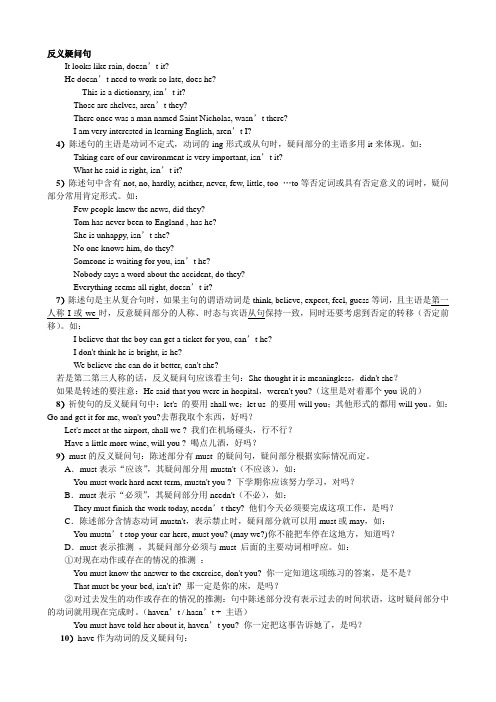
反义疑问句It looks like rain, doesn’t it?He doesn’t need to work so late, does he?This is a dictionary, isn’t it?Those are shelves, aren’t they?There once was a man named Saint Nicholas, wasn’t there?I am very interested in learning English, aren’t I?4)陈述句的主语是动词不定式,动词的-ing形式或从句时,疑问部分的主语多用it来体现。
如:Taking care of our environment is very important, isn’t it?What he said is right, isn’t it?5)陈述句中含有not, no, hardly, neither, never, few, little, too …to等否定词或具有否定意义的词时,疑问部分常用肯定形式。
如:Few people knew the news, did they?Tom has never been to England , has he?She is unhappy, isn’t she?No one knows him, do they?Someone is waiting for you, isn’t he?Nobody says a word about the accident, do they?Everything seems all right, doesn’t it?7)陈述句是主从复合句时,如果主句的谓语动词是think, believe, expect, feel, guess等词,且主语是第一人称I或we时,反意疑问部分的人称、时态与宾语从句保持一致,同时还要考虑到否定的转移(否定前移)。
初中英语反义疑问句的用法归纳
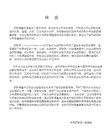
5)陈述句中含有not, no, hardly, neither, never, few, little, too …to等否定词或具有否定意义的词时,疑问
Few people knew the news, did they?
He dare not say so, dare you?
当dare, need 为实义动词时,疑问部分用助动词do + 主语。
She doesn't dare to go home alone, does she?
12)感叹句中,疑问部分用be +主语。
What colours, aren't they?
.must表示“必须”,其疑问部分用needn't(不必),如:
They must finish the work today, needn’t they? 他们今天必须要完成这项工作,是吗?
.陈述部分含情态动词mustn't,表示禁止时,疑问部分就可以用must或may,如:
You mustn’t stop your car here, must you? (may we?)你不能把车停在这地方,知道吗?
You must have told her about it, haven't you?你一定把这事告诉她了,是吗?
11)带情态动词dare或need的反意疑问句,疑问部分常用 need (dare ) +主语。
We need not do it again, need we ?
(haven’t / hasn’t + 主语)
You must have told her about it, haven’t you? 你一定把这事告诉她了,是吗?
初中英语反义疑问句用法归纳

反义疑问句一、反意疑问句要点简述反意疑问句又叫附加疑问句,是在陈述句后,对陈述句所叙述的事实提出的疑问。
其基本结构有两种:一是“肯定陈述句+简略否定问句”;二是“否定陈述句+简略肯定问句”。
反意疑问句后一部分的主谓与前一部分的主谓要保持人称、助动词及时态等方面的一致,即“三同一反”的原则。
这种疑问句的回答要根据事实,肯定的用“Yes, …”。
否定的用“No, …”。
如:It looks like rain, doesn’t it?He doesn’t need to work so late, does he?二、学习反意疑问句,特别要注意的问题1)陈述部分的主语是this, that时,疑问部分的主语多用it;陈述部分的主语是these, those时,疑问部分的主语多用they如:This is a dictionary, isn’t it?Those are shelves, aren’t they?2)陈述句如果是there be结构时,疑问句部分仍用there。
如:There once was a man named Saint Nicholas, wasn’t there?3)在英语口语中,“I am +表语结构”,后面的反意疑问句多用aren’t I来体现。
如:I am very interested in learning English, aren’t I?4)陈述句的主语是动词不定式,动词的-ing形式或从句时,疑问部分的主语多用it来体现。
如:Taking care of our environment is very important, isn’t it?What he said is right, isn’t it?5)陈述句中含有not, no, hardly, neither, never, few, little, too …to等否定词或具有否定意义的词时,疑问部分常用肯定形式。
英语反义疑问句表格
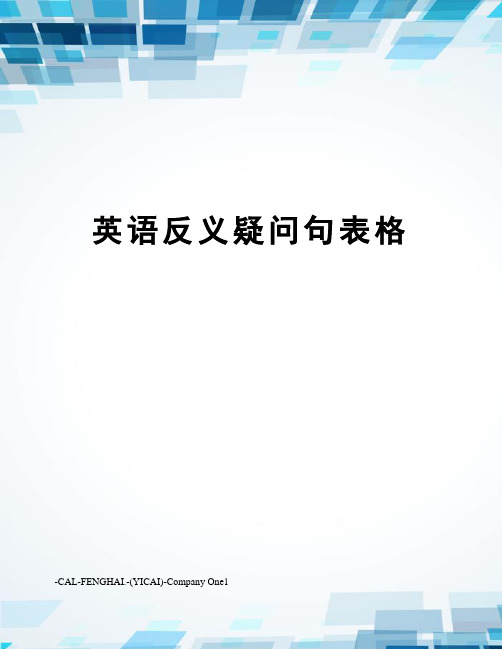
用should或had
We had better go right now, shouldn’t we / hadn’t we
may
may 主语 + not
They may be here next week, may they not?
must(必须)
用needn’t
You must do it today, needn’t you?
Let me help you, may I?
Let’s …
shall we
Let’s go for a walk, shall we?
let us …
will you
Let us do it by ourselves, will you?
Let接第三人称
will you
Let him come in, will you?
用do
They all have a good time, don’t they?
have to
用do或have
We have to get up early, don’t we / haven’t we?
have got to
用have
We have got to answer all the questions, haven’t we
英语反义疑问句表格
谓语不一致的若干情况如下(需牢记):
前谓语
后谓语
例句
have (有)
have或do
Mary has two brothers, doesn’t she / hasn’t she?
have (有)
与陈述
部分一致
He hasn’t a lot of time, has he?
最新反义疑问句(教案)

教学过程一、复习预习1、教师出示上节课预留的练习题,根据学生实际情况进行讲解分析;2、引导学生复习上节内容;3、并引入本节课程内容。
二、知识讲解考点/易错点1 反义疑问句基本原则1、遵循“前否后肯”或“前肯后否”的原则:Jim isn’t in Class Four, is he?2、前后两句主语相同:Mr Zhang has been here for four years, hasn’t he? 考点/易错点2 主语选用的特殊情况考点/易错点3 谓语选用特殊情况考点/易错点4 否定词的特殊情况句中有seldom, hardly, no, not, never, few, little, nothing, nobody, nowhere等是否定句,疑问部分必须采用肯定形式:Nobody phoned while I was out, did they?He is hardly able to swim, is he?There is little ink in your pen, is there?三、例题精析【1】I am right , ____________ ?答案:aren’t I【2】They can hardly believe it,________ ___________ ?答案:can they,他们很难相信(这件事),是吗?【3】Give me some money, _________ ____________?答案:will you,给我一些钱,好吗?四、课堂运用【基础】一、填空1.It’s very hot today, _______________ ?2. He can speak Chinese, _______________ ?3. Meimei studies in a middle school, _______________ ?4. He never gets up late , _______________ ?5. Don’t go out at night, _______________ ?【巩固】二、填空1.Everything starts to grow in spring, _______________ ?2.He can hardly finish his homework, _______________ ?3.I’m in Class 3,Grade 2, _______________ ?4.Let’s go shopping , _______________ ?5.She doesn’t like climbing hills , _______________ ?【拔高】三、单项选择1. Linda ate nothing this morning, ___?A. didn’t sheB. was sheC. did sheD. wasn’t she2. There’s hardly___ milk in the bottle, _____there?A. no, isn’tB. some, isC. little, isn’tD. any, is3. He has never ridden a horse before, ___?A. does heB. has heC. hasn’t heD. doesn’t he4. — He seldom came here, _____?— Yes sir.A. didn’t heB. does heC. doesn’t heD. did he5. Everything seems all right, _____ ?A. does itB. don’t theyC. won’t itD. doesn’t it7. One can’t be too modest, can _____ ?A. oneB. heC. itD. we8. No one failed in the exam, _____ ?A. was heB. did oneC. did theyD. didn’t he10. Neither you nor I am a artist, _____ ?A. am IB. aren’t weC. are weD. amn’t I答案:一、1 . isn’t it 2. can’t he 3.doesn’t she 4.does he 5.will you二、1.doe sn’t it 2.can he 3 .aren’t I 4.shall we 5.does she三、1—5 CDBDD 6—10 BACDC课程小结这节课我们主要学习了反义疑问句相关知识。
- 1、下载文档前请自行甄别文档内容的完整性,平台不提供额外的编辑、内容补充、找答案等附加服务。
- 2、"仅部分预览"的文档,不可在线预览部分如存在完整性等问题,可反馈申请退款(可完整预览的文档不适用该条件!)。
- 3、如文档侵犯您的权益,请联系客服反馈,我们会尽快为您处理(人工客服工作时间:9:00-18:30)。
初中英语教案反义疑问句的用法归纳表格以下是我整理的初中英语教案反义疑问句的用法归纳表格,希望可以帮到大家。
初中英语反意疑问句的具体用法【1】1) 陈述部分的主语是i,疑问部分要用arent i.im as tall as your sister,arent i?2) 陈述部分的谓语是wish,疑问部分要用may +主语。
i wish to have a word with you, may i?3) 陈述部分用no, nothing, nobody, never, few, seldom, hardly, rarely, little等否定含义的词时,疑问部分用肯定含义。
the swede made no answer, did he / she?some plants never blown (开花), do they ?4) 含有ought to 的反意疑问句,陈述部分是肯定的,疑问部分用shouldnt / oughtnt +主语。
he ought to know what to do, oughtnt he? / shouldnt he?5) 陈述部分有have to +v. (had to + v.),疑问部分常用dont +主语(didnt +主语)。
we have to get there at eight tomorrow, dont we?6) 陈述部分的谓语是used to 时,疑问部分用didnt +主语或usednt +主语。
he used to take pictures there, didnt he? / usednt he?7) 陈述部分有had better + v. 疑问句部分用hadnt you?youd better read it by yourself, hadnt you?8) 陈述部分有would rather +v.,疑问部分多用wouldnt +主语。
he would rather read it ten times than recite it, wouldnt he?9) 陈述部分有youd like to +v. 疑问部分用wouldnt +主语。
youd like to go with me, wouldnt you?10) 陈述部分有must 的疑问句,疑问部分根据实际情况而定。
he must be a doctor, isnt he?you must have studied english for three years, havent you? / didnt you?he must have finished it yesterday, didnt he?11) 感叹句中,疑问部分用be +主语。
what colours, arent they?what a smell, isnt it?12) 陈述部分由neither nor, either or 连接的并列主语时,疑问部分根据其实际逻辑意义而定。
neither you nor i am engineer, are we?13) 陈述部分主语是指示代词或不定代词everything, that, nothing, this, 疑问部分主语用it。
everything is ready, isnt it?14) 陈述部分为主语从句或并列复合句,疑问部分有三种情况:a. 并列复合句疑问部分,谓语动词根据邻近从句的谓语而定。
mr. smith had been to beijing for several times, he should havebeen in china now, shouldnt he?b. 带有定语从句,宾语从句的主从复合句,疑问部分谓语根据主句的谓语而定:he is not the man who gave us a talk, is he?he said he wanted to visit japan, didnt he?c. 上述部分主句谓语是think, believe, expect, suppose, imagine 等引导的定语从句,疑问部分与宾语从句相对应构成反意疑问句。
i dont think he is bright, is he?we believe she can do it better, cant she?15) 陈述部分主语是不定代词everybody, anyone, somebody, nobody, no one等,疑问部分常用复数they,有时也用单数he。
everyone knows the answer, dont they? (does he?)nobody knows about it, do they? (does he?)16) 带情态动词dare或need的反意疑问句,疑问部分常用need (dare ) +主语。
we need not do it again, need we ?he dare not say so, dare you?当dare, need 为实义动词时,疑问部分用助动词do + 主语。
she doesnt dare to go home alone, does she?17) 省去主语的祈使句的反意疑问句,疑问部分用will you。
dont do that again, will you?go with me, will you / wont you ?注意:lets 开头的祈使句,后用shall we?let us 开头的祈使句,后用will you?lets go and listen to the music, shall we?let us wait for you in the reading-room, will you ?18) 陈述部分是there be结构的,疑问部分用there省略主语代词。
there is something wrong with your watch, isnt there?there will not be any trouble, will there?19) 否定前缀不能视为否定词,其反意疑问句仍用否定形式。
it is impossible, isnt it?he is not unkind to his classmates, is he?20)must在表推测时,根据其推测的情况来确定反意疑问句。
he must be there now, isnt he?it must be going to rain tomorrow, wont it?快速记忆表陈述部分的谓语疑问部分i arent iwish may +主语no ,nothing nobody, never ,few, seldom, hardly, rarely, little等否定含义的词肯定含义ought to(肯定的) shouldnt/ oughtnt +主语have to+v.(had to+v.) dont +主语(didnt +主语)used to didnt +主语或usednt +主语had better + v. hadnt youwould rather + v. wouldnt +主语youd like to + v. wouldnt +主语must 根据实际情况而定感叹句中be +主语neithernor, eitheror 根据其实际逻辑意义而定指示代词或不定代词everything ,that, nothing ,this 主语用it 并列复合句谓语根据邻近从句的谓语而定定语从句,宾语从句的主从复合句谓语根据邻近从句的谓语而定主从复合句根据主句的谓语而定think ,believe, expect, suppose, imagine等引导与宾语从句相对应的从句everybody ,anyone, somebody, nobody ,no one 复数they, 单数he情态动词dare或need need (dare ) +主语dare, need 为实义动词do +主语省去主语的祈使句will you?lets 开头的祈使句shall we?let us 开头的祈使句will you?there be 相应的谓语动词+there(省略主语代词)否定前缀不能视为否定词仍用否定形式初中英语反义疑问句【2】反意疑问句一、反意疑问句中三种基本形式, (反意疑问句中问句部分的动词与陈述部分的动词在语气上成相反的对应关系)1、前肯后否:they are very late for the meeting, arentthey? hegoes to school by bike, doesnt he?2、前否后肯:youcant do it, can you?tomhasnt been to shanghai , hasnt he ?3、祈使句的反义疑问letsgo to the park , shall we ?comehere , will you ?注意问题:1、语气相反2、反意疑问句中问句部分的动词与陈述部分的动词种类要对应一致。
如:②he has supper at home every day, doesnt he? (不能用hasnt he?)一般现在时②theyhave known the matter, havent they?(不能用dont they?)现在完成时3、反意疑问句中问句部分的动词在时态上应和陈述部分的时态一致。
如:①theywill go to town soon, wontthey?(不能用dont they?或arent they?)4、反意疑问句的陈述部分带有little, few, never,hardly, seldom 等否定意义的词时,问句部分用肯定式。
如:①she nevertells a lie, does she?(不用doesnt she?)5、反意疑问句的陈述部分为i am时,问句部分习惯上用arent i?表示。
如:i am a very honest man, arent i?6、反意疑问句的陈述部分为i(we) think(believe,suppose, consider) + that从句时,问句部分的动词及主语与that从句内的动词和主语保持一致。
如:i think that he has done his best, hasnt he?we think that english is very useful, isnt it? (不用dont we?)7、反意疑问句的陈述部分为非第一人称主语+ think(believe,suppose, consider) + that从句时,问句部分的动词和主语与陈述部分的主句动词和主语保持一致。
